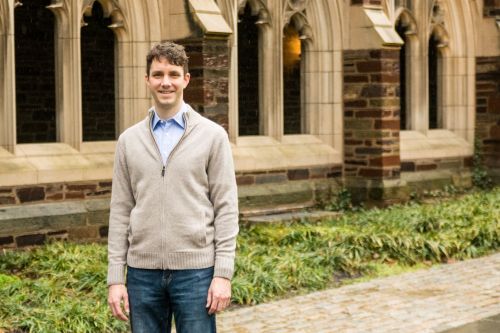
Like the rotational flows he studies, in many ways, Professor Clancy Rowley’s career has come full circle. Nearly three decades ago, he was a freshman at Princeton living in a Butler dormitory and tinkering around in the machine shop. He started in physics but soon fell in love with fluid mechanics, and subsequently research, during an introductory course and summer internship with Professor Alexander (Lex) Smits.
“Fluid mechanics did not seem all that interesting to me when I first signed up for the course, but then I learned all the fascinating and unexpected things that fluids do—even something as simple as flow past a cylinder does surprising things when you alter the speed, density, or viscosity,” he says. “Part of the reason I enjoyed the subject and ended up going to graduate school was that I had Lex as a teacher and mentor. I am so grateful for his early inspiration.”
For the past 17 years, Professor Rowley has had the opportunity to inspire students in the very same place where he studied. “I remember getting nostalgic my senior year at Princeton and thinking it would be a dream to come back as a teacher someday,” he recalls. “But I never thought it would actually happen.”
Before he joined the faculty at Princeton, Professor Rowley completed a PhD at the California Institute of Technology, specializing in dynamics and control systems. While many of the buildings and labs have changed, the guiding principles of what it means to be a Princetonian—innovation, curiosity, and imagination—still roam the Ivy-covered campus.
“The most inspiring thing about teaching is explaining a subject I love to students who know nothing about it. I have the privilege of watching them fall in love too,” says Professor Rowley. “It is like show and tell—I feel like I am showing students my favorite toy.”
Professor Rowley knows firsthand that a great class can change a student’s trajectory. “I am always touched when alumni, who are now working in the industry at a place like Bell Helicopters or SpaceX, come back and thank me for teaching them their first course in control systems,” he says.
His favorite project is teaching students to program a mechanical arm that can balance an inverted pendulum. “Imagine how difficult it would be to balance a tiny stick on your hand,” he explains. “If you figure out the right mathematical model, you can design a computer control system that does it for you. It is a light bulb moment for students.”
Professor Rowley’s research also uses computational systems to make problems easier. Experimental capabilities have improved so dramatically in the last decade that researchers are often left with gigabytes of data to sort through. His job is to sift through the noise, developing data-driven models that pare down large data sets and extract key features.
“In addition to helping researchers better understand data, these mathematical models have broader applications for developing methods to control fluids,” he explains. “For example, you can reduce the drag on an aircraft to save fuel or develop more energy-efficient combustion engines.”
It is the collaborative nature of research that Professor Rowley most enjoys and is the hallmark of his research today. “My early exposure was not sitting in an office working alone; it was sharing ideas and figuring out how we could make something work together. I enjoy basic research and the freedom to really dive deeply into a problem and understand what is going on,” he explains.
The first project he ever worked on as an undergraduate was designing a Mach-8 wind tunnel for the Gas Dynamics Lab at Forrestal campus. Professor Rowley and his teammates had to figure how to build a heater that would raise the temperature of the air to 1,100 °F and then use water jets to cool the air down at the back end.
“We were considering connecting the water jets directly to the town water supply, but we were concerned that if the water pressure dropped momentarily, for instance from flushing toilets, then the water jets wouldn’t function, and we might melt something. I spent the better part of the afternoon watching the pressure gauge while Lex and his graduate students ran around flushing toilets as fast as they could,” he recalls.
For a long time, that lab was Professor Rowley’s favorite spot on campus. Today, he has a soft spot for Rockefeller (Rocky) College, one of six residential colleges for undergraduate students, where he serves as head.
“The residential colleges are kind of like the houses in Harry Potter, except one of them is not evil,” he jokes. “Rocky has a beautiful gothic dining room that reminds me of Hogwarts. I love to watch the students hang out there, chat with friends, or play the piano. What I enjoy so much about first-year students is that they have no limits to their imagination. They are so enthusiastic and positive from day one.”
Sometimes, Professor Rowley will even play a few tunes himself. Although he is a classically trained pianist and played the organ in church in his youth, most often when he sits down to play today it is jazz. “I love playing jazz because it is so improvisational, free, and creative—it is very much a release for me,” he says.
While it is nice to have an escape every now and then, Professor Rowley says he seldom needs a break from the hurdles that are an inevitable part of research. “Problems I know how to solve are boring,” he says. “The tough problems, well, those are the fun ones. They are the reason why I still love research after all this time.”
-Carolyn Sayre